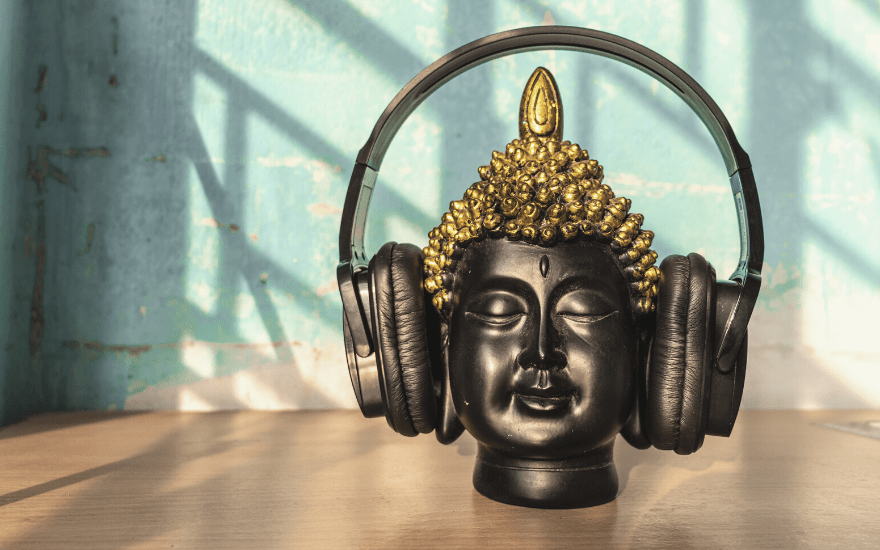Last Updated on June 3, 2023

From childhood to adulthood, music will always be a crucial part of our lives. Music has a physical and psychological impact on us humans. And not only does it impact all of our lives, but music also has many surprising therapeutic qualities!
As we all know, music can be a powerful medium for changing our state of mind. More specifically, music can be very effective in producing a deep state of healing relaxation, reducing stress in the process, and even promoting sleep. Listening to music can also help improve your self-esteem and stimulate personal development and transformation.
Music has existed since ancient times. It is in the rhythm of nature, from birds chattering in the morning to the relaxing sounds of waves crashing on rocks. Listen, and you will hear all the sweet tones, creating their magic.
What are the Benefits of Music On the Brain?
Music seems to play many different roles in our lives and can do wonders for our brains. Below are some of the many benefits of listening to music on the brain:
1. Brain Development
Studies have shown that children who learn music are more likely to become doctors, engineers, and computer professionals. Music learning develops the brain regions responsible for language, memory, and reasoning.
Its also been shown that if a pregnant woman listens to music, the baby is born with highly developed intelligence.
2. Healing Power
The therapeutic value of music is fully proven. It can treat people with mental illnesses, developmental and learning disabilities, Alzheimer’s disease, traumatic brain injury, and high blood pressure.
Children who grow up in a music-filled environment are also feeling more fulfilled, happier, and joyful.
3. Calming Effect
Music has meditation properties and can be used to calm us down!
Playing music in hospital waiting rooms, etc, reduces tension and calms the mind.
4. Helps Us Function Better
When music is playing, people function better. Many people like to work, cook, clean, and do other tasks while listening to music. It reduces tension and gives us some extra motivation!
5. Strengthen Relationships
Music reflects on social culture and strengthens connections. It creates a sense of friendship and unity in football matches, military training, and festivals. It also shapes our ability to learn coordination, teamwork, discipline, and self-expression.
6. Lifts the Spirit
Music quickly eliminates anger and dissatisfaction and also helps us overcome feelings of sadness and hopelessness. It lifts the mind and spirit from despair and gives us hope when we need it the most!
Did you know that classical music can soothe and open the channels in your mind, while rock music can make your heart beat faster, and chants can send you into a trance?
Different ways of using music have variable effects on us humans. Music can be a healing cure or a living hell, depending on how it’s being used!
Disadvantages to Music
With the good, comes the bad. Below are some of the negative effects of music on the brain and body:
- Listening to sad music can impact your life negatively. It can result in you seeing the world from a more negative perspective, especially for those who already struggle with depression or mental health issues.
- Your ears may suffer. Hearing loss or decreased hearing is an unfortunate consequence of listening to loud music through headphones.
- Listening to music through headphones can also become overstimulating for infants and children. They are still developing and are not ready to process the intensity of the sound stimulus. It’s simply just too much for them.
- Music can cause aggressive thoughts and more violent behavior, especially for those who get influenced easily.
- Anxiety as a result of listening to music is also possible. Certain genres, artists, or songs can trigger negative responses psychologically.
Become aware of how the music you listen to affects you emotionally. And, besides turning down the volume a few notches, which will benefit your ears in the long run, keep enjoying the sweet sounds of music!
Music for Healing
In today’s world, music therapy began to help veterans heal their physical and emotional wounds. As many patients responded well, nurses and doctors began to ask musicians to provide treatment. And since then, music therapy has become popular worldwide, not just to heal veterans, but research showed that it also benefited many other groups of people.
The use of music for therapy can be a very effective way to reach children and adolescents. Likewise, the elderly and people with developmental and learning disabilities, people with Alzheimer’s disease and age-related problems, and people with acute pain can also benefit from music therapy. It is a powerful way to help people express their emotions.
Even healthy people can benefit from the healing power of music. Listening to music, playing, or producing music can significantly reduce stress and increase productivity.
“One good thing about music, when it hits you, you feel no pain.” – Bob Marley
How to Discover the Healing Power of Music
You don’t need to go to a music therapist to discover the healing power of music. You can get started by yourself! Below are 5 tips to follow:
- You should listen to your favorite music genre, and just in case you don’t like Mozart and classical music, then don’t listen to it. Good, high-quality music can be found in most music genres.
- Choose music that you have pleasant associations with or music that brings you joyful memories.
- If you want to try new music, instrumental music tends to calm you and reduce stress compared to music with lyrics, because it does not require you to think.
- Racing thoughts often lead to anxiety and stress. For that reason, you should listen to a slow-paced music rhythm to slow down your body and mind.
- Choose music with regular pulsation or beats. That’s because research has discovered that music with a healthy and stable heartbeat rhythm can synchronize with your breathing and heartbeat.
Music is even listened to in surgical operations. Surgeons listen to their favorite music while operating the patient. That’s because they know the power of music and its profound impact on their ability to concentrate and focus on work. Surgeons listen to Mozart, Wagner, and Handel, and sometimes rock, jazz, or pop music, and claim that it gives them more energy.
And for the patient, less anesthesia is needed, they feel less anxious before the operation, less pain after, faster recovery, quicker hospital stay, and so on.
Take advantage of the healing power of music on the brain. If you listen to the right music, it will bring your miraculous wonders!
See also:
If you enjoyed reading about the benefits of music, I would be very grateful if you share the post on Twitter, Facebook, or Pinterest! Thank you❤️
📌 PIN THIS POST FOR LATER


Hello, my name is Sara and I am the founder of Spiritvibez, I’m here to guide you on your spiritual journey toward healing, growth, and self-discovery. I believe that true transformation occurs when the mind, body, and spirit are aligned and working in harmony. Through Spiritvibez, I hope to inspire and empower you to deepen your spiritual practice, embrace your authentic self, and begin living your best life.
